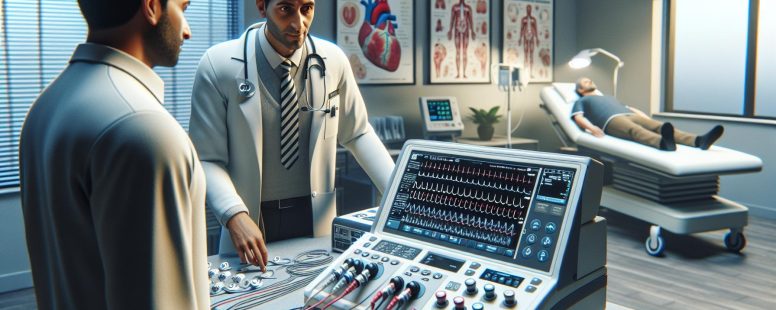Difference Between ECG and Echo: Understanding Heart Health Tests and Their Unique Benefits
Understanding ECG And Echo
Both ECGs and echocardiograms are diagnostic tools used to assess heart health. These tests provide different types of information about the heart’s condition.
What Is An ECG?
An ECG, or electrocardiogram, measures the heart’s electrical activity. It records patterns of heartbeats to detect irregular rhythms, heart rate, and electrical signal strength. The test uses small electrodes attached to your chest, arms, and legs. Doctors use ECGs to identify arrhythmias, heart attacks, and other electrical disturbances. For example, an ECG can detect atrial fibrillation or blocked coronary arteries.
What Is An Echo?
An echo, or echocardiogram, uses ultrasound to create moving images of the heart. It shows the structure of heart chambers, valves, and blood flow in real-time. Doctors perform echocardiograms to assess heart size, detect valve-related conditions, and evaluate pumping function. For instance, an echo can identify congestive heart failure or damaged heart valves. It involves a handheld device called a transducer placed on your chest to capture images.
Key Differences Between ECG And Echo
An ECG and an echocardiogram differ in technology, purpose, and the information they provide about heart health. Understanding these distinctions enhances your ability to interpret their roles in diagnosis.
Technology And Methods
An ECG uses electrodes placed on your chest, arms, and legs to measure electrical signals in your heart. These signals create a graph showing heart rhythm and electrical activity.
An echocardiogram uses an ultrasound device to generate sound waves. These waves produce real-time moving images of your heart’s structure and blood flow.
Purpose And Applications
Doctors use ECGs to detect irregular heart rhythms, monitor heart rate, and identify signs of heart attacks. It’s essential for detecting arrhythmias and evaluating electrical function.
Echocardiograms assess heart size, pumping strength, and valve performance. They help diagnose conditions like heart failure, valve diseases, and structural abnormalities.
Information Provided
ECGs provide data on your heart’s electrical patterns, such as timing and irregularities. Abnormal results may reveal arrhythmias, conduction issues, or a prior heart attack.
Echocardiograms give visual details of your heart’s anatomy, including chamber size, valve function, and blood flow. This helps evaluate structural problems or reduced pumping efficiency.
Pros And Cons Of ECG And Echo
Both ECG and echocardiogram are essential diagnostic tools, but they have distinct strengths and limitations. Understanding these is key to selecting the appropriate test for specific heart concerns.
Advantages Of ECG
- Quick and Non-Invasive: ECGs take 5–10 minutes, with electrodes placed on the skin. They cause no pain or discomfort.
- Detects Electrical Abnormalities: ECGs identify irregular rhythms, heart rate issues, and disruption in electrical signals, useful for conditions like arrhythmias and heart attacks.
- Widely Available: ECG equipment is accessible in most healthcare settings. It’s affordable compared to complex imaging tests.
- Real-Time Results: Doctors can interpret results almost immediately, ensuring prompt diagnosis in emergencies.
Advantages Of Echo
- Visual Heart Analysis: Echo provides detailed images of heart chambers, valves, and blood flow, helping to diagnose structural abnormalities.
- Dynamic Function Monitoring: Real-time imaging assesses the heart’s pumping strength, valve performance, and blood flow direction. This is vital for detecting conditions like heart failure and valve diseases.
- Non-Invasive and Safe: The ultrasound technology used poses no radiation risk, making it safe for repeated use and during pregnancy.
- Versatile Diagnostic Application: Echo helps confirm or rule out congenital defects, infections such as endocarditis, or fluid buildup around the heart.
Limitations Of Each
- ECG Limitations: While ECG identifies electrical issues, it doesn’t provide information about structural problems or heart valve performance. An abnormal ECG may require follow-up with more advanced imaging tests.
- Echo Limitations: Echo tests take longer than ECG and may not detect issues related to electrical activity, such as arrhythmias. It’s also more expensive and requires highly trained technicians.
- Accuracy Constraints: ECG accuracy can fluctuate with external factors like electrode placement, while echo image clarity may reduce in patients with obesity or lung disease.
When To Choose ECG Or Echo
Choose an ECG when detecting electrical issues in the heart is the priority. ECGs help identify problems like arrhythmias, irregular heart rates, or the effects of a heart attack. Doctors often recommend ECGs for symptoms such as chest pain, dizziness, or shortness of breath if they need quick results on heart rhythm.
Choose an echocardiogram when assessing heart structure or function is necessary. Echocardiograms provide images of heart chambers, valves, and blood flow, making them important for evaluating structural abnormalities. This test is often useful for diagnosing valve problems, assessing heart size, or identifying potential heart failure. It may also be used after abnormal ECG results to investigate further.
Use both tests in specific cases where both electrical activity and structural heart health need to be evaluated. For instance, a patient with symptoms of heart disease could undergo an ECG to check for arrhythmias and then an echocardiogram to evaluate damage to heart muscles or valves.
Conclusion
Understanding the differences between an ECG and an echocardiogram empowers you to make informed decisions about your heart health. Each test serves a unique purpose, providing critical insights into either the heart’s electrical activity or its structure and function.
By knowing when and why these tests are used, you can work more effectively with your doctor to address any concerns. Whether it’s identifying arrhythmias or evaluating heart valves, these tools play a vital role in diagnosing and managing heart conditions.
- OLED vs QLED: Unraveling the Key Differences for Your Next TV Purchase - October 22, 2025
- Psychologist Versus Psychiatrist: Key Differences to Choose the Right Mental Health Professional - October 22, 2025
- Prime Rib vs Ribeye: The Key Differences Between These Popular Beef Cuts Explained - October 22, 2025





